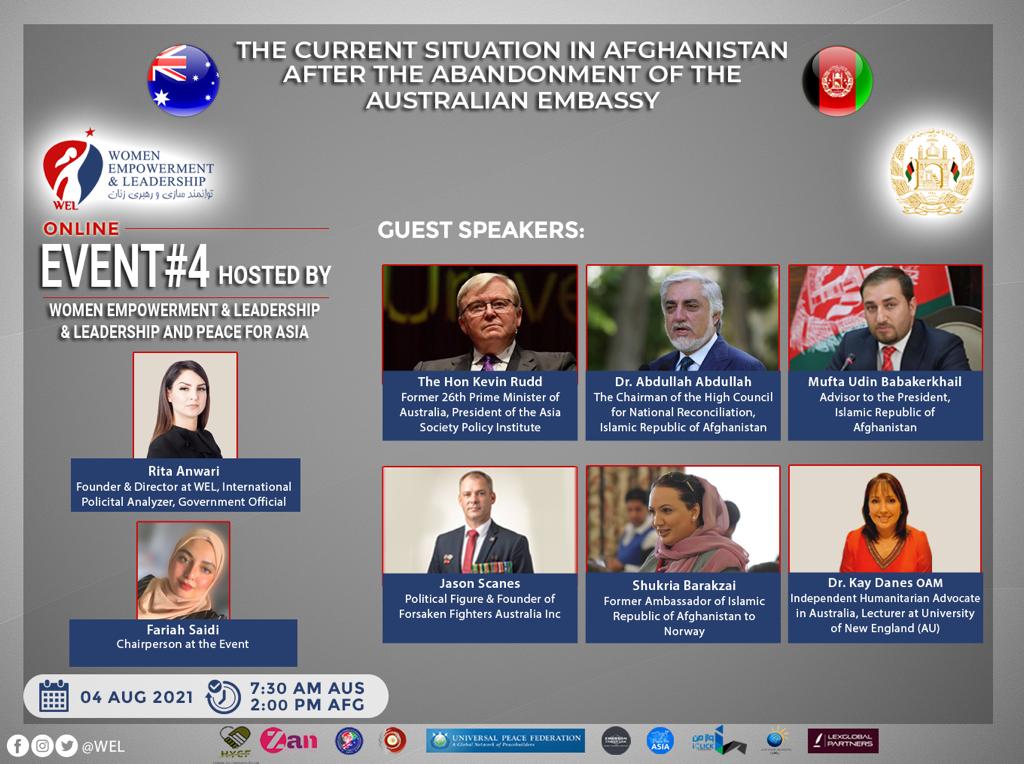CLCIK HERE TO WATCH ENTIRE EVENT
The events unfolding in Afghanistan portend difficult times for the elected regime in Kabul and may spillover into outright violation of the Universal Declaration of Human Rights. It is very discouraging to see Afghanistan being kept out of the Humanitarian intervention debate. Given the Taliban’s advances, Afghanistan faces a bleak future ahead and it is felt that after American exit, even the Humanitarian Aid Organizations may find it difficult to address the crisis in the making.
Peace for Asia, in collaboration with Zan TV and Women Empowerment and Leadership organized a webinar discussing the situation in Afghanistan. Former Australian Prime Minister H.E. Kevin Rudd and the leader of High Council for National Reconciliation H.E. Dr. Abdullah Abdullah participated as our Chief Guests. Other participants included:
Shukria Barakzai (Former Afghan Ambassador to Norway)
Kay Danes (Humanitarian Advocate and Lecturer, University of New England)
Jason Scanes (Founder, Forsaken Fighters Australia Inc)
Mufta Udin Babakerkhail (Advisor to the President, Islamic Republic of Afghanistan)
The webinar was moderated by Rita Anwari (Founder & Director at WEL, International Political Analyzer, Government Official) and Fariha Saidi (Chairperson of the Event, ZAN TV)
In the backdrop of the evolving situation in Afghanistan, where the Taliban has made significant territorial gains, it is crucial to evaluate Afghan-Australia ties considering Canberra’s strong relationship with the post 9/11 regimes in Kabul. In June, Australia became the first country in the Western alliance to wind up its diplomatic mission in Afghanistan, raising questions on the sustainability of its partnership with Afghanistan.
Recalling his travels and meetings with the Afghan politicians as the then Foreign Minister of Australia, Rudd discussed Australia’s role in Afghanistan post 9/11 and his role in the gradual deepening of the bilateral relationship after he became the Prime Minister in 2007.
He expressed his disapproval at the international community’s evasive stance on Afghanistan. “Too much has been spent in blood and treasure by the good people of Afghanistan, its soldiers and allies”, and to walk away in this manner was distressing, Rudd stated. Reflecting on the present situation, Rudd pointed out the Taliban’s paradoxical stance wherein it engaged in violence and negotiations at the same time. It was high time that the major international stakeholders were made to acknowledge that the Taliban were not negotiating in good faith and that the challenges to the elected government were very very serious. The international community needs to put “maximum pressure on any government that engaged in direct communication with the Taliban” since this would tantamount to abetting attacks on the democratic regime in Kabul.
Dr Abdullah stated that while there was a consensus that peaceful settlement was the only way forward (even agreed by the Taliban in the peace deal), no solution would be possible if one side continued to use violence. Such military adventures would only lead to the continuation of war. Peace would continue to elude Afghanistan. The Taliban have not changed and their methods and tactics remain the same, he said. Nevertheless, he hoped that the international community would take cognizance of the ongoing situation.
Taking a more direct stance, Shukria Barakzai felt that Pakistan deserves responsibility for the current situation in Afghanistan. Its dual policies were evident in its dealings with the international community, where it expressed its support for peace but in actuality it provided that material and logistical support to the Taliban. There could be no progress in the region unless the international community takes steps to hold the individuals and institutions accountable.

